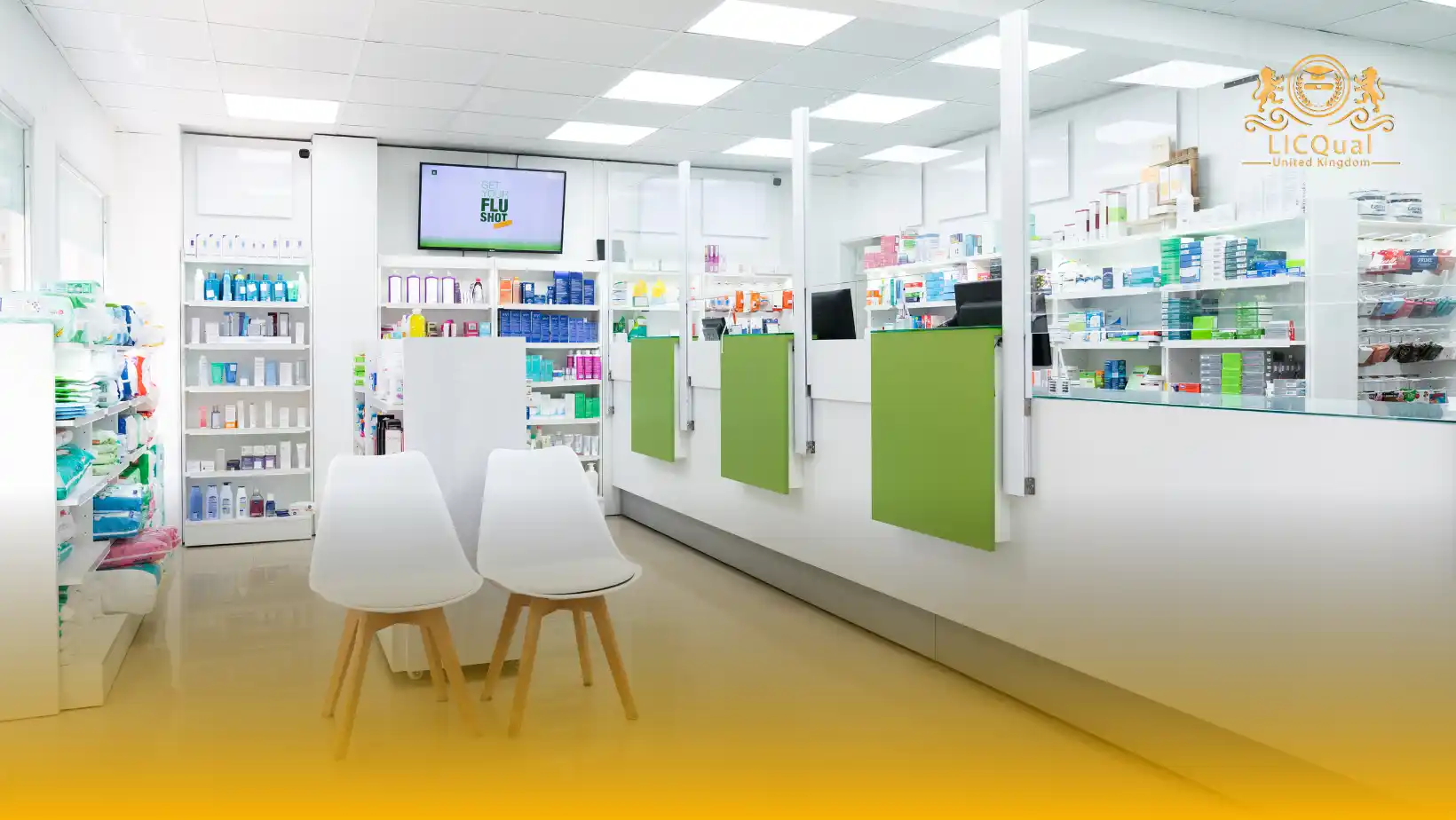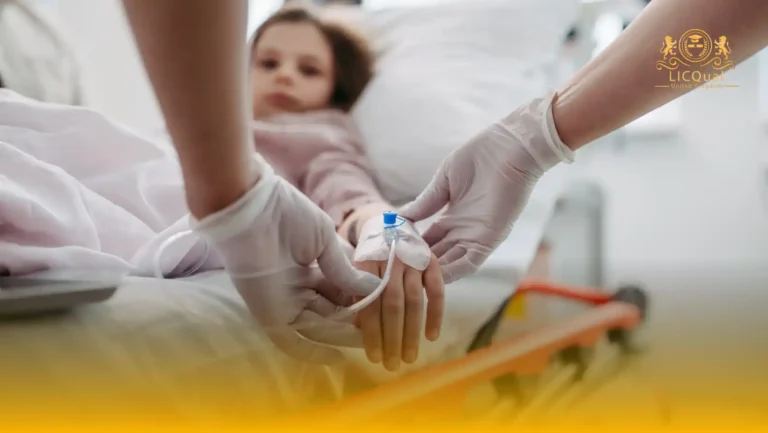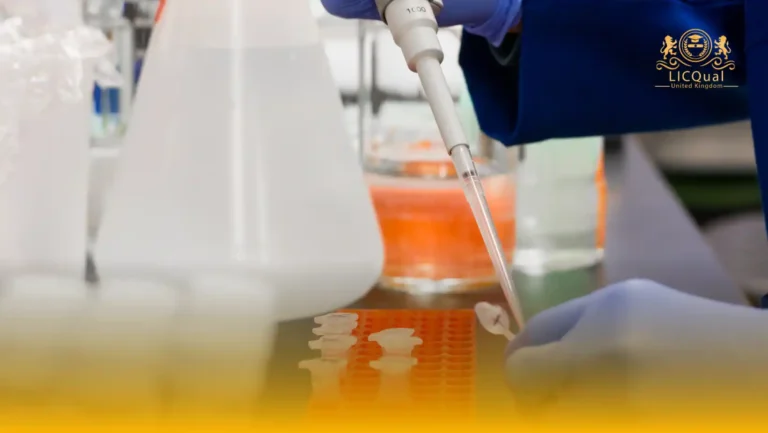The LICQual Level 3 Diploma in Hospital Pharmacy (Dip Hospital Pharmacy) is a specialized qualification designed to equip learners with the knowledge and skills required to excel in hospital pharmacy settings. This diploma covers essential aspects of pharmaceutical practice, including the management of medicines, clinical pharmacy, dispensing procedures, and patient safety.
This qualification is ideal for learners who wish to enhance their career prospects, expand their knowledge, and strengthen their Continuing Professional Development (CPD). The course provides a comprehensive understanding of hospital pharmacy operations, regulatory requirements, and best practices, enabling learners to contribute effectively to multidisciplinary healthcare teams. It combines theoretical learning with practical applications, preparing learners for real-world challenges in hospital pharmacy environments.
Centres delivering this diploma must ensure the presence of competent and qualified staff, as well as access to up-to-date resources, training materials, and professional facilities. These requirements are essential to provide learners with a high-quality learning experience and ensure they gain the practical and theoretical skills necessary for success.
The Level 3 Diploma in Hospital Pharmacy offers learners a recognized pathway for career progression within the pharmaceutical and healthcare sectors. By completing this programme, learners demonstrate professional competence, ethical practice, and a commitment to ongoing development, positioning themselves for roles in hospital pharmacy, clinical support, and other healthcare-related positions.
Course Overview
Qualification Title
LICQual Level 3 Diploma in Hospital Pharmacy (Dip Hospital Pharmacy)
Total Units
6
Total Credits
60
GLH
240
Qualification #
LICQ2201176
Qualification Specification
To enroll in the LICQual Level 3 Diploma in Hospital Pharmacy (Dip Hospital Pharmacy) , applicants must meet the following criteria:
|
Qualification# |
Unit Title |
Credits |
GLH |
|---|---|---|---|
|
LICQ2201176-1 |
Introduction to Hospital Pharmacy Practice |
10 |
40 |
|
LICQ2201176-2 |
Medicines Management and Dispensing Procedures |
10 |
40 |
|
LICQ2201176-3 |
Clinical Pharmacy and Patient Care |
10 |
40 |
|
LICQ2201176-4 |
Pharmacy Legislation, Governance, and Ethics |
10 |
40 |
|
LICQ2201176-5 |
Laboratory and Practical Skills in Hospital Pharmacy |
10 |
40 |
|
LICQ2201176-6 |
Professional Development and Continuing Pharmacy Practice |
10 |
40 |
By the end of this course, learners will be able to:
Unit 1: Introduction to Hospital Pharmacy Practice (10 Credits, 40 GLH)
By the end of this unit, learners will be able to:
- Explain the role and responsibilities of hospital pharmacy within the healthcare system.
- Identify the structure and organisation of hospital pharmacy services.
- Analyse the importance of multidisciplinary collaboration in patient care.
- Apply foundational pharmacy principles to support safe and effective practice.
Unit 2: Medicines Management and Dispensing Procedures (10 Credits, 40 GLH)
By the end of this unit, learners will be able to:
- Demonstrate safe and accurate dispensing of medications.
- Apply procedures for stock control, storage, and handling of medicines.
- Evaluate processes for reducing dispensing errors and improving patient safety.
- Implement best practices in medicines management in clinical settings.
Unit 3: Clinical Pharmacy and Patient Care (10 Credits, 40 GLH)
By the end of this unit, learners will be able to:
- Explain principles of clinical pharmacy and patient-centred care.
- Assess patient needs and provide appropriate medication advice.
- Analyse the impact of medications on patient health outcomes.
- Apply clinical knowledge to support decision-making in hospital pharmacy.
Unit 4: Pharmacy Legislation, Governance, and Ethics (10 Credits, 40 GLH)
By the end of this unit, learners will be able to:
- Demonstrate knowledge of relevant pharmacy legislation and regulatory frameworks.
- Explain professional standards and ethical responsibilities in hospital pharmacy.
- Analyse the implications of non-compliance on patient safety and service quality.
- Apply ethical principles to professional practice and decision-making.
Unit 5: Laboratory and Practical Skills in Hospital Pharmacy (10 Credits, 40 GLH)
By the end of this unit, learners will be able to:
- Demonstrate essential laboratory and compounding techniques in pharmacy practice.
- Perform accurate pharmaceutical calculations for dispensing and preparation.
- Apply safe handling procedures for sterile and non-sterile products.
- Evaluate practical outcomes and ensure compliance with quality standards.
Unit 6: Professional Development and Continuing Pharmacy Practice (10 Credits, 40 GLH)
By the end of this unit, learners will be able to:
- Demonstrate a commitment to Continuing Professional Development (CPD).
- Reflect on personal skills, strengths, and areas for improvement.
- Apply teamwork, communication, and professional behaviour in hospital pharmacy settings.
- Develop a professional development plan to support career progression in hospital pharmacy.
The LICQual Level 3 Diploma in Hospital Pharmacy (Dip Hospital Pharmacy) is designed for learners who want to specialize in clinical pharmacy, hospital medication management, and patient‑centered care. This internationally accredited qualification is ideal for pharmacists, nurses, healthcare professionals, graduates, and policy makers who want to strengthen their expertise in hospital pharmacy and improve patient safety. Whether you are starting your career or advancing into leadership roles, this diploma equips you with the skills, recognition, and confidence to succeed in the growing field of hospital pharmacy.
1. Pharmacists and Pharmacy Technicians
- Pharmacists aiming to specialize in hospital pharmacy and clinical practice
- Pharmacy technicians seeking accredited qualifications in hospital medication management
- Professionals wanting to reduce risks in prescribing and dispensing medicines in hospitals
- Staff preparing for roles in hospital pharmacy departments and clinical services
- Learners interested in international standards for hospital pharmacy and patient safety
2. Nurses and Clinical Healthcare Staff
- Nurses aiming to improve patient safety in hospital care settings
- Clinical staff seeking practical skills in medication adherence and monitoring
- Professionals wanting to strengthen knowledge of hospital drug interactions
- Learners preparing for supervisory or quality assurance roles in hospital clinics
- Staff aiming to contribute to safer healthcare delivery systems for patients
3. Healthcare Professionals Focused on Clinical Care
- Doctors and practitioners specializing in hospital‑based patient care
- Professionals seeking accredited qualifications in hospital pharmacy and advanced therapies
- Staff wanting to enhance evidence‑based practice in hospital pharmacy services
- Individuals aiming to expand career opportunities in hospitals and healthcare facilities
- Healthcare workers preparing for leadership roles in clinical pharmacy practice
4. Graduates in Life Sciences and Medicine
- Students with degrees in medicine, nursing, or pharmacy
- Fresh graduates seeking specialized training in hospital pharmacy
- Learners aiming to boost employability with accredited qualifications
- Individuals preparing for careers in hospital pharmacy and healthcare innovation
- Graduates interested in international hospital pharmacy standards
5. Pharmaceutical Industry Professionals
- Employees working in drug manufacturing and hospital medication supply chains
- Clinical trial coordinators seeking knowledge of hospital medication protocols
- Staff aiming to strengthen compliance with global hospital pharmacy regulations
- Professionals preparing for leadership roles in pharmaceutical hospital research
- Individuals wanting to integrate hospital pharmacy into drug development processes
6. Policy Makers and Regulatory Authorities
- Professionals working in healthcare policy and regulation
- Staff involved in drug approval and compliance processes for hospital care
- Individuals aiming to strengthen expertise in international hospital pharmacy standards
- Learners preparing for advisory or consultancy roles in healthcare quality
- Policy makers seeking deeper knowledge of hospital medication safety frameworks
7. Career Changers Entering Hospital Pharmacy
- Professionals from other industries transitioning into healthcare and hospital pharmacy
- Individuals seeking a structured pathway into hospital medication management
- Learners aiming to gain practical, job‑ready skills quickly
- Career changers motivated by opportunities in hospital pharmacy and clinical practice
- Those wanting internationally recognized qualifications to boost employability
Centres delivering the LICQual Level 3 Diploma in Hospital Pharmacy (Dip Hospital Pharmacy) must meet stringent standards to ensure high-quality training, learner success, and professional credibility. Key requirements include:
- Qualified and Competent Staff: Tutors, assessors, and internal quality assurers must hold relevant qualifications and have professional experience in hospital pharmacy, healthcare, or related scientific fields.
- Learning Resources: Centres must provide access to up-to-date study materials, pharmaceutical references, laboratory equipment, and digital learning platforms to support effective learner engagement.
- Practical and Laboratory Facilities: Safe, fully equipped laboratories and practical training spaces must be available to ensure hands-on learning and compliance with health and safety standards.
- Assessment and Quality Assurance: Centres should implement robust assessment procedures, internal verification, and secure record-keeping to maintain transparency and integrity of learner outcomes.
- Commitment to CPD: Teaching and assessment staff must actively engage in Continuing Professional Development (CPD) to maintain up-to-date knowledge and best practices.
- Policies and Procedures: Centres must have clear policies on equality, diversity, safeguarding, and learner support, providing a professional and inclusive learning environment.
- Technology and Accessibility: Centres must ensure learners have access to IT facilities, e-learning tools, and online support for blended or distance learning delivery.
By meeting these requirements, centres provide a high-quality learning environment that equips learners with the knowledge, skills, and practical experience needed to succeed in hospital pharmacy and healthcare practice.
Assessment and Verification
All units within this qualification are subject to internal assessment by the approved centre and external verification by LICQual. The qualification follows a criterion-referenced assessment approach, ensuring that learners meet all specified learning outcomes.
To achieve a ‘Pass’ in any unit, learners must provide valid, sufficient, and authentic evidence demonstrating their attainment of all learning outcomes and compliance with the prescribed assessment criteria. The Assessor is responsible for evaluating the evidence and determining whether the learner has successfully met the required standards.
Assessors must maintain a clear and comprehensive audit trail, documenting the basis for their assessment decisions to ensure transparency, consistency, and compliance with quality assurance requirements.







